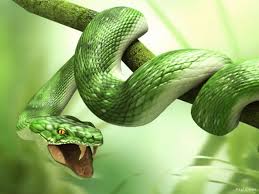记忆方法
音似“蛇喷他”——能喷毒液的蛇——大毒蛇
中文词源
serpent 蛇
来自古法语 serpent,蛇,来自拉丁语 serpens,蛇,爬行生物,来自 serpere,爬行,来自 PIE*serp, 爬行,词源同 herpetology,herpes.
英语词源
- serpent
-
serpent: [14] The serpent is etymologically a ‘crawling’ animal. The word comes via Old French serpent from Latin serpēns, a noun use of the present participle of serpere ‘crawl, creep’. This was a close relative of Greek hérpein ‘creep’, from which English gets herpes [17] (etymologically the ‘creeping’ disease) and herpetology ‘study of reptiles’ [19].
=> herpes - serpent (n.)
- c. 1300, "limbless reptile," also the tempter in Gen. iii:1-5, from Old French serpent, sarpent "snake, serpent" (12c.), from Latin serpentem (nominative serpens) "snake; creeping thing," also the name of a constellation, from present participle of serpere "to creep," from PIE *serp- "to crawl, creep" (cognates: Sanskrit sarpati "creeps," sarpah "serpent;" Greek herpein "to creep," herpeton "serpent;" Albanian garper "serpent").
Used figuratively of things spiral or regularly sinuous, such as a type of musical instrument (1730). Serpent's tongue as figurative of venomous or stinging speech is from mistaken medieval notion that the serpent's tongue was its "sting." Serpent's tongue also was a name given to fossil shark's teeth (c. 1600).
权威例句
- 1. He felt as if a serpent had spat venom into his eyes.
- 他感觉就像有一条蛇朝自己的双眼里喷射了毒液。
- 2. The serpent fascinated its prey.
- 这条蛇震慑住了它要捕食的动物.
- 3. There's a serpent beside him.
- 他身边有条大蛇.
- 4. Don't believe him, he is a serpent.
- 别相信他, 他是个狡猾的家伙.
- 5. We have had a grand voyage and seen a sea - serpent.
- 我们的航行非常棒.我们看到了 海蛇.

